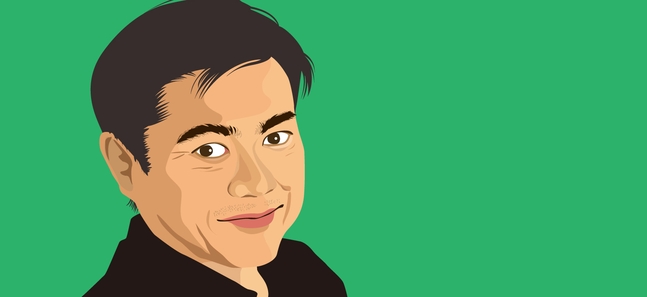The Hot Seat: Joi Ito
Time Out Tokyo sits down with the new director of the MIT Media Lab

イラストレーション: Haruna Nitadori. Original picture, Mizuka Ito
Posted: Tue May 31 2011
Despite the boyish looks and vaguely hippy background (his godfather was psychedelic explorer Timothy Leary), Joi Ito is an intimidating man to interview. As he explains here, his big thing is 'lowering the walls' and making the world he inhabits appear less formidable to the rest of us, but it's hard not to be awed by a man who wields heavy influence so very lightly.
Born in Kyoto in 1966, the internationally educated Ito dropped out of two different colleges and, as early as 1985, became one of the first people to register for and study an online course. This knack for early adoption served him well in later years, and he's now credited with a hodgepodge variety of 'firsts', even having helped kickstart the nascent rave scene in Japan.
While past jobs have included DJ and nightclub owner ('working in a pet shop', he interjects when we ask him about it later), it's his presence on the board of countless internet powerhouses that has brought him real international attention. Creative Commons, Technorati, ICANN, Mozilla – each have had Ito's creative input, and as an early stage investor, the list grows longer still: Last.fm, Flickr, Twitter…
All of these involvements go some way toward explaining why he's been identified as 'one of the most influential people on the web' (Businessweek, 2008), and why, in late April, he was named as the new director of the MIT Media Lab – a controversial decision, but one that Joi talks about with the energy of an excited schoolboy. Intimidated to begin with, I quickly realise that all you need do when interviewing Joi Ito is turn your tape recorder on and get out of the way. He's a busy man with a heck of a lot to say.
You're living in Dubai, right?
I live in Dubai, yes, but I go around the world every month once or twice.
Why Dubai?
It's a good hub for the Middle East, and it's relatively neutral. For me, North Africa and the Middle East are really interesting places in terms of emerging over the next five to 10 years, so I'm spending lots of my time and energy to develop my contacts there and understand the region a little bit better.
Don't you find the region limiting in terms of internet censorship?
Well, there have been more governments overthrown here recently because of the internet than anywhere else in the world! (Laughs) For me, I like to be in places that are changing, and it's too late to go somewhere after it starts changing. The potential for change in the Middle East is enormous. You've got two or three hundred million people who speak Arabic, you've got an average age in the twenties, you've got money that's not that well distributed, but is increasingly becoming better distributed; I think there's a tremendous amount of potential. If you ran over to China right now to try and start something, it's pretty crowded. I think it's time to be investing energy in the Middle East. But, you never know (laughs). It wouldn't be a risk if it were for sure.
You're involved with LinkedIn now, which feels like it has been around for years. Why do you think the time is right now for its arrival in Japan?
They've been looking at the Japanese market since 2007, and we, Digital Garage, have been helping them. But it wasn't until 2011 that they started the global expansion plan, and not really until now that they decided to do Japan. A lot of it has to do with, you know...if you want to do Japan, you have to do it right. The really good news is that in the interim there really hasn't been a service like this in Japan that has succeeded. There hasn't been a competitor. The closest competitor is probably Facebook, but Facebook is different because it's about sharing pictures of the karaoke session and not really the business transactions.
You were famously an early adopter of Twitter in Japan, which has been a phenomenal success. What do you see as being the key differences between how it's used here and how it's used abroad?
There are little quirky things, but I think the biggest difference is that, because Twitter decided to define 140 characters as 140 characters rather than 140 bytes, or whatever, you can write a lot more in Japanese than you can in English, which changes the tone of the conversation. You find people literally writing essays on Twitter in Japan, whereas in the US it's really tricky to fit stuff into 140. But with most things like blogs or Tumblr, you see the Japanese community being very different to the US, while Japanese Twitter is more similar than I might've expected. I think the Japanese have used 'favouriting' a little more than in the US, and the Japanese have built different kinds of services using Twitter API, and they have their own dialect, like 'blah blah blah nau', but those aren't significant differences. It's interesting that there's a kind of commonality.
Does Facebook have any chance at all of catching up with Twitter here?
Facebook is more complicated to use [than Twitter] and they keep releasing new features, which is why it's great, but it also makes it more difficult for people to understand. I know a lot of hardcore users in Japan are getting really excited about Facebook because of the growth and because of the Social Network movie, but I think Facebook is fundamentally a complicated product. It'll be interesting. Twitter has reached people in Japan because of the earthquake, and it's still kind of difficult to explain how to use it to someone who has never used it before, but the interface is really simple. In that sense, I think Facebook may get a very different following, and it may take market share away from some of the other social network services. I think Twitter has got its own segment now. In the US, most people use both. My guess is, and I wouldn't want to speculate too much, they're different enough that I don't think Facebook will make a huge dent on Twitter here in Japan.
But people the world over manage to learn how to use Facebook add-ons easily enough. Why would you suppose the Japanese can't?
That's a good question. I think a lot of Japanese use Facebook – it's not that much more complicated than Mixi or anything like that. But if you look at the total market size of Mixi, it's pretty small relative to the entire population of people online in Japan. Most people don't use Mixi, whereas I think I can see a time when most people use Twitter kind of in the same way most people use email. In that sense, I think it's different.
On your blog, you describe yourself as an 'informal learner', someone who dropped out of formal education. Can you elaborate a little more on that?
I was interested in media, music, video games, computers – a lot of the stuff I was interested in weren't things they were going to be teaching in school, as far as I could tell. My sister is very much a straight 'A' student with two PHDs, and if you think relatively longterm, and you can see where you want to go, then I think formal education provides a pretty good path to measure where you are and what you need to do next. If you're not very longterm, and as a child and even today I'm not – I chart general trajectories, but I don't like to plan things – it was hard for me to motivate myself to do things 'because I had a plan'. Getting a grade from school didn't seem like enough of an incentive to do something. It was more, 'Will this help me figure out how to launch my model rocket, and will I get feedback immediately?' There are people who learn well from reading books and are able to synthesise one-way information, and there are others who learn through interaction – tinkering with things, building things, talking to other people – and that tends to be my mode of learning. When I wanted to learn more about music, I went and became a disc jockey; when I wanted to learn more about movies, I worked on a movie set. I was lucky because I really got excited about computer networking, and so the medium that I wanted to learn was also a great place to learn all this stuff. I went to college in '84, before most computer networking stuff was available to undergraduates in colleges. But I could log into university computer networks and talk to people who were actually building these things. For me, it just worked out. I wouldn't recommend that everyone drop out of school. For most people, school is probably a pretty good place to learn a lot of this stuff, but it depends on your area of interest and your personality.
Do you think the Japanese education system is well set up to produce Joi Itos of the future?
I don't think Japan's doing a very good job, which is why I'm on the board at Nishimachi International School, and I care about it. There are a number of different reasons. I think that Japan is a big enough market that you can kind of ignore the rest of the world and do OK for yourself; at least you could in the past. In large companies, a lot of what people did was focus on developing their power base in Tokyo, because in a very inwardly focused company and market it makes sense to do that. But with the Japanese market shrinking, and Japan becoming less and less relevant, I think being international and global is important, now more than ever. Before, you'd just leave it up to the trading companies and exporters to be international, and they'd kind of bring home the bacon and then everyone in Japan just kind of figured out how to divvy it up, and they created this Japan Inc contraption to spend the money. There was definitely some internal production and GDP, but generally Japan-focused companies weren't very efficient. I think [Japan] is going through a transformation, and it's going to be tricky because education and big company corporate culture is such a fundamental thing to change. I think it needs to change. I don't know if we're going to be successful in time, though, because we don't have a lot of time left.
That's an ominous statement!
(Laughs even more ominously.)
On the subject of your Media Lab appointment, you wrote that you felt like a pilgrim in the middle ages entering a cathedral, and that you didn't fit into something like that. Why that feeling? It seems like the ideal setup for you.
Have you ever been to one of these old cathedrals, like Santiago? It's just so impressive that you feel like falling to your knees and praying and believing in God! The Media Lab is kind of like that. It's kind of a grey building on the outside, and you walk in and it's this brilliant white atrium and robots and people and sunlight, and it feels like you're in the future! (Laughs) It was so impressive, it was kind of intimidating. But what you realise when you talk to people is that, while they're all extremely smart, they're also very down to earth and very, like, 'Hey! Let's do something!' It's not an ivory tower at all.
What kind of legacy would you like to leave when your days at the lab are finally up?
I think that the Media Lab feels like an impressive institution that everyone knows about, but I'd like the brand to be something much more inviting. I'd like the image to change from a kind of distant fortress to something that everyone has touched at some level, and to make it more like a platform. The fact that everyone now watches those TED videos makes them something that everyone talks about, whereas before they were just something that happened far away, that rich and famous people went to and we didn't really know what happened. So I want to lower the walls and make Media Lab more accessible to people, both coming in and going out. I'd also really like to increase its diversity. I'd love for the sponsors and organisations that interact with the Media Lab to diversify to non-profits and social entrepreneurs and all kinds of different institutions. I'd like to really increase the geographic diversity – the Middle East, Africa, Japan. Japan has a relationship, but it's through a certain category of big companies. I'm bringing the Tokyo Hackerspace guys to the Media Lab next week. I really want to get the grass level ingenuity of Japan connected to the Media Lab. I'm much more grass roots and populist in the way that I function, so I'd like to see if I could influence the Media Lab in that way. Also, the Media Lab has been identified a lot more with digital things and more recently with life sciences, but depending on how long I'm around, I think there are a lot of other areas of research we should explore. The connection to Silicon Valley isn't as strong as it could be, and the connection to other areas around the world… [Sounds breathless] I guess, to sum it up, it'd be making Media Lab more accessible and more of a platform, and increasing the diversity of the people and places that interact.
A lot of work then...
Yeah! (Laughs) There's a lot of paperwork going on, but I'll probably begin in the fall. For all practical purposes, though, I've taken the position and I'm there every month, and I'm spending a substantial amount of time on Media Lab stuff already. I've got an email address and a phone already. I'm kind of like a volunteer (laughs).
Follow the continuing adventures of Joi Ito on his personal blog: joi.ito.com
Tags:
Tweets
- About Us |
- Work for Time Out |
- Send us info |
- Advertising |
- Mobile edition |
- Terms & Conditions |
- Privacy policy |
- Contact Us
Copyright © 2014 Time Out Tokyo


















Add your comment